|
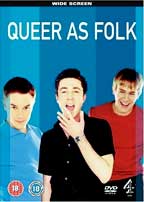
Queer
As Folk
British Series
C1TV, 1999
Directors:
Charles McDougall, Sarah Harding
Screenplay:
Russell T Davis
Starring: Aiden
Gillan, Craig Kelly, Charlie Hunnam. Denise Black, Andy Devine, Carla
Henry, Antony Cotton, Jason Merrells
Unrated, (8) 40 minute
episodes
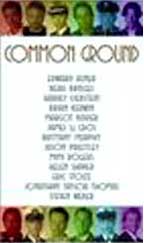
Common
Ground
Showtime Video,
2000
Director:
Donna Dietch
Screenplay:
Paul Vogel
Terrence McNally
Harvey Fierstein
Starring: Brittany
Murphy, Jason Priestly, Margot Kidder, Mimi Rogers, Brian Kerwin, Jonathan
Taylor Thomas, Steven Webber, Eric Stolz, Andrew Airlie, James Legros,
Ed Asner, Harvey Fierstein
Unrated, running
time: NA
|
Cathode
Queers
by
Michael D. Klemm
Reprinted
from Outcome, March 2000
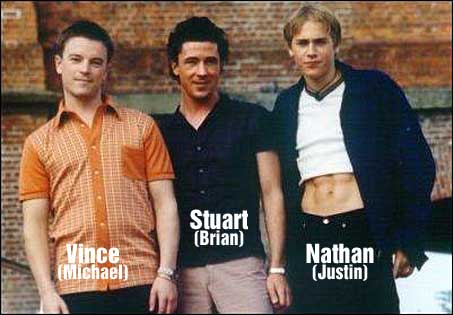
When it comes to
sexual matters, British television is far more permissive than American
TV. Anyone who grew up watching Monty Python's Flying Circus on
PBS knows this. Ditto for Masterpiece Theatre's I, Claudius, which
featured nudity and a few sneak peaks at Roman orgies. Knowing this still
didn't prepare me for Queer as Folk,
a completely refreshing and no-holds-barred look at gay life that was
aired on England's Channel 4 last year.
Queer
As Folk
takes place in, and around, the gay club scene in Manchester. Its eight
episodes focus on three young gay men. Stuart, played by Aiden Gillen,
is a party boy whose main priority is his "shag" for the evening.
Craig Kelly plays his best friend, Vince, a fervent Dr. Who devotee
who lives in Stuart's shadow. Both men are just months away from turning
30 while Nathan, played by Charlie Hunnam, is 15 and ventures into a gay
bar for the first time. He goes home with Stuart and is heartbroken later
to discover that he was nothing more than just "another shag."
 Much
of the series revolves around Stuart's shenanigans as he has sex with
almost every good looking gay man in Manchester. In contrast, each man
that Vince brings home is a disaster. Equal time is also given to Nathan's
coming out issues both at school and at home. Despite a supportive mother,
Nathan runs away from home rather than face his bigoted father. While
dealing with Stuart's rejection, he loses his innocence and even turns
the tables on his first shag a few times. Nathan is not an angst-ridden
suicidal gay teen-ager. Out and proud, he mocks his schoolmates to his
best friend Donna: "They're just kids. They're just talking. I'm
doing it!" Much
of the series revolves around Stuart's shenanigans as he has sex with
almost every good looking gay man in Manchester. In contrast, each man
that Vince brings home is a disaster. Equal time is also given to Nathan's
coming out issues both at school and at home. Despite a supportive mother,
Nathan runs away from home rather than face his bigoted father. While
dealing with Stuart's rejection, he loses his innocence and even turns
the tables on his first shag a few times. Nathan is not an angst-ridden
suicidal gay teen-ager. Out and proud, he mocks his schoolmates to his
best friend Donna: "They're just kids. They're just talking. I'm
doing it!"
Surrounding these
men is a colorful assortment of friends who provide myriad subplots. A
lesbian couple named Romy and Lisa use Stuart's sperm to have a baby.
Stuart calls the baby "the most expensive wank [he] ever had"
and spends little to no time with his son. Vince's mother hangs out at
the clubs and lets Nathan stay at her place until he sorts out his problems
at home. She also befriends Nathan's mother, and tries to help the distraught
woman to understand her son.
Stuart is the series'
most complex character. While seemingly a total jerk, he occasionally
tries to do good. An attempt to bring his young trick back home to his
family backfires when Nathan's father sees them together. When a married
client goes pubbing with him, and then plans to party for a few more days
rather than go home, Stuart asks him if he's ready to abandon his family
and then talks him into going home. In one of the best scenes, a friend
dies of an overdose and Stuart and Vince sneak into his apartment to clear
out his porn before the man's mother comes to pack up his things.
 But
his relationship with Vince is the crux of the series. Because they were
friends since boyhood, Stuart is oblivious to Vince's true feelings for
him. Queer As Folk has all
the intrigues of a late night soap opera but it's all set in the queerest
of millieus. The writing is very sharp and drama queens will love all
the snappy lines. Queer As Folk
is the brainchild of writer Russell T. Davies. In an online interview,
he expressed his disgust with cute, cuddy and/or victimized gays and decided
to just write a story that told it like it is. Making no apologies for
presenting excesses on the party circuit,
Queer As Folk is filled with loose sex, drugs and "morality"
that would send the Rev. Fred Phelps into a rubber room. The series was
embraced by its gay audience and sparked outrage amongst conservatives.
It even offended a few gays who were concerned over the series' depiction
of loose behavior. But
his relationship with Vince is the crux of the series. Because they were
friends since boyhood, Stuart is oblivious to Vince's true feelings for
him. Queer As Folk has all
the intrigues of a late night soap opera but it's all set in the queerest
of millieus. The writing is very sharp and drama queens will love all
the snappy lines. Queer As Folk
is the brainchild of writer Russell T. Davies. In an online interview,
he expressed his disgust with cute, cuddy and/or victimized gays and decided
to just write a story that told it like it is. Making no apologies for
presenting excesses on the party circuit,
Queer As Folk is filled with loose sex, drugs and "morality"
that would send the Rev. Fred Phelps into a rubber room. The series was
embraced by its gay audience and sparked outrage amongst conservatives.
It even offended a few gays who were concerned over the series' depiction
of loose behavior.
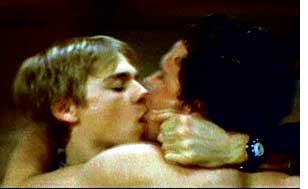 The
biggest bone of contention was Stuart shagging Nathan in the very first
episode while the camera lingers over their nude bodies. Sex is common
on British TV, but "R-rated" gay sex is still a new phenomenon.
Was it irresponsible for the filmmakers to make the first sex scene one
that involved a minor? Maybe. Do such things sometimes happen in real
life, and is this scene important to the overall story? Yes. Queer
As Folk makes Will and Grace look like Ozzie
and Harriet. There is no effort made to make its characters more acceptable
to conservative straights. The
biggest bone of contention was Stuart shagging Nathan in the very first
episode while the camera lingers over their nude bodies. Sex is common
on British TV, but "R-rated" gay sex is still a new phenomenon.
Was it irresponsible for the filmmakers to make the first sex scene one
that involved a minor? Maybe. Do such things sometimes happen in real
life, and is this scene important to the overall story? Yes. Queer
As Folk makes Will and Grace look like Ozzie
and Harriet. There is no effort made to make its characters more acceptable
to conservative straights.
[Reviewer's
note from 2007: There was a 2 hour sequel that was broadcast a year
later on Britain's Channel 4 and, though it has its moments, was not
as good as the original 8 part series. In fact, the ending may be one
of the worst endings ever committed to film. Russell Davis, the show's
creator, would later bring back Dr.
Who to the BBC - which is quite fitting,
considering all the affectionate references to Dr.
Who throughout the original QAF.
Vince's passion for Dr. Who was the inspiration for Michael's love of
comic books in the Showtime version.]
[Reviewer's note
2008: More viewers have seen the Showtime version than the original.
I just watched the British QAF
again for the first time in years and, while some of its initial shock
value is gone, it is still a very good series. It's been overshadowed
by the American version which is a pity because this one
did come
first and it is worthy of consideration in its own right. In many ways,
it is more gritty and realistic than the stateside series. Phil, unlike
Ted in the remake, actually
dies from
his
drug overdose. Many of Stuart's shags are ordinary looking blokes while
Brian's tricks on the newer show all looked liked they stepped out of
an underwear ad. Many visual gags are much funnier and more creatively
filmed in this one - for example, take the scene where Vince calls Stuart,
and leaves a message to tell him that he finally scored, as Stuart is
shagging two guys in bed while a video camera films their threeway.
And the moment where Stuart gives Vince an exact replica of Dr. Who's
robot dog, K-9, on his 30th birthday blows the Captain Astro comic book
from the Showtime version out of the water.
The American
characters closely mirrored their British counterparts but there are
a lot of differences in the original - some of them much more compelling.
The dynamic between Stuart and Nathan is much different from what eventually
developed between Brian and Justin. Vince, unlike Michael in the remake,
never seems
to get over his infatuation with Stuart, and his mother - while not
quite
as colorful as Sharon Gless - is also one of the series' best characters.
Just as many contend that the original British version of The
Office
is better than the American one, the same case can be made for the British
Queer
as Folk.
Even if you ultimately prefer Brian, Michael and Justin over Stuart,
Vince and Nathan, it is still worth a look.
Unfortunately, the
original never had a proper video release in this country and it appears,
at this writing, to be out of print. It lists for $149 from a third party
seller on Amazon.com. When I purchased it - before the Showtime remake
even aired - it was a very expensive bare-bones DVD where each chapter
consisted of two complete episodes. They spared no expense. There
is also a scene missing in the first episode. I distinctly remember seeing
Vince put a Dr. Who video in his VCR and watching a scene where
a Cyberman (the next most recurring bad guys after the Daleks) was holding
down a victim but, because of the camera angle, it looked like it was
getting head. The lack of extras, not to mention chapters, is infuriating
but it's the only DVD released here in the states - unless you have an
all-region player because Amazon lists a British import box set of the
first season and the 2 hour sequel.]
American television,
even on premium cable stations, has yet to display the same boldness as
England's Channel 4. A case in point is the recent Showtime original movie,
Common Ground. While the movie
is admirable by American TV standards, it almost seemed anti-climatic
after seeing Queer as Folk.
|
|
Common
Ground
is a trilogy of gay-themed screenplays directed by lesbian filmmaker Donna
Dietch, (Desert Hearts), and written
by three noted gay playwrights: Pulitzer Prize winner Paula Vogel, Terrence
McNally and Harvey Fierstein. Each takes
place in the fictional small town of Homer, Connecticut during three different
decades. Each story is narrated by the man who raises the flag at the
War Memorial on the Town Commons.
The strongest segment
is the first, A Friend of Dorothy, penned by Vogel. A young woman
named Dorothy, played by Brittany Murphy, comes home from the military
in 1954 but remains vague about her reasons for leaving the service. The
truth comes out when she applies for a job at the school and the principal
asks to see her discharge papers. He orders her to leave when he discovers
her Section 8 discharge for "sexual perversion." Dorothy's mother
calls her a degenerate and throws her out of the house. She is shunned
by everyone in town and eventually leaves for Greenwich Village on the
advice of Janet, a sympathetic woman (and closeted lesbian) who runs the
town's diner.
[Reviewer's
note, 2007: Perhaps I was unaware when this was written in 2000, but Janet
is played by Desert Hearts' Helen Shaver]
 The
70s segment, M. Roberts, was written by McNally
and deals with the trials of Toby, a gay teen-ager played by Jonathan
Taylor-Thomas, who is harassed at school. The boy suspects that his French
teacher, played by Steven Weber, is gay and reaches out to him for help.
His teacher is, indeed, gay but remains closeted because he is
in line to become the school's principal. The
70s segment, M. Roberts, was written by McNally
and deals with the trials of Toby, a gay teen-ager played by Jonathan
Taylor-Thomas, who is harassed at school. The boy suspects that his French
teacher, played by Steven Weber, is gay and reaches out to him for help.
His teacher is, indeed, gay but remains closeted because he is
in line to become the school's principal.
The concluding segment,
Andy and Amos, is Harvey Fierstein's comic look at the town's first
gay wedding in present day. Andy and Amos, played by Andrew Airlie and
James Legros, have been together for over 15 years and plan to have a
public ceremony. Amos' stubborn father, played by Ed Asner, is leading
a protest of veterans who object to the marriage taking place on the grounds
of the War Memorial. He winds up bonding with his son when he realizes
that he is actually having cold feet on his wedding day just like he once
did.
Fierstein's contribution
to Common Ground is the most
saccharine of the three. Vogel's A Friend of Dorothy features the
sharpest writing. Her vivid ironies include Dorothy's mother screaming
that she will "not have filth and perversion in [her] home"
and then sitting down to watch the McCarthy hearings on television. The
richest scenes involve Dorothy telling Janet about her experiences in
the Navy. A very butch commanding officer, played by Mimi Rogers, orders
her charges to report any lesbianism to her immediately. Dorothy
meets a sensitive officer named Billy, played by Jason Priestly, who calls
himself "a friend of Dorothy." This is code for homosexual and
he takes Dorothy to a gay bar.
 The
defining moment occurs when Dorothy's CO, wearing an evening dress, enters
the bar. Shortly after, the bar is raided and Dorothy is ordered by her
superiors to name names. She remembers seeing her CO but says nothing.
Her CO expels her from the service. Now... was her CO checking out the
bar for enlisted men and women? Or is she a closeted gay who, like Roy
Cohn, mercilessly persecutes her own? Like Vogel's play, How I Learned
To Drive, nothing is black and white and the ambiguities raised elevate
the story above the mundane. The
defining moment occurs when Dorothy's CO, wearing an evening dress, enters
the bar. Shortly after, the bar is raided and Dorothy is ordered by her
superiors to name names. She remembers seeing her CO but says nothing.
Her CO expels her from the service. Now... was her CO checking out the
bar for enlisted men and women? Or is she a closeted gay who, like Roy
Cohn, mercilessly persecutes her own? Like Vogel's play, How I Learned
To Drive, nothing is black and white and the ambiguities raised elevate
the story above the mundane.
McNally's contribution
is well done but the basic plotline, minus a few moments permissible only
on cable, could easily have also been an ABC Afterschool Special. Fierstein's
segment is mostly comic in the vein of his Torch
Song Trilogy. Amos complains to his father that he's "a gay
man in a heterosexual world and it doesn't matter anymore!" When
his father points to the handful of veterans and Catholics protesting,
Amos shouts "If that's all the outrage they can muster then
this is embarrassing." Fierstein can still deliver a good laugh.
When the father quotes Leviticus, Amos points out that Leviticus also
states that eating shellfish and pork is an abomination. "According
to your Bible," he says, "the road to Hell is paved with bacon.
So I'll make a deal with you. You take the sausage out of your mouth and
I'll take the sausage out of mine."
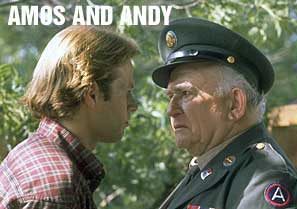 A
worthy theme that runs through the three stories is the responsibility
of the current generation to "stand up and be counted" to make
things easier for those that will follow. Janet gives Dorothy money to
go to Grenwich Village because an older woman once helped her on the condition
that she would someday aid another "promising young woman."
She passes the torch to Dorothy, who leaves Homer, Connecticut and never
returns. The 70s French teacher is afraid to jeopardize his position at
the school but, after Toby is beaten, he comes out to his class and subsequently
loses his job. He regains it, never becomes principal, but stays in Homer
and lives openly with his lover. At Andy and Amos' wedding, Amos proclaims
his debt to the gays who came before and acknowledges that "it's
up to us to do our very best to carry the next generation to where they
need to be." A
worthy theme that runs through the three stories is the responsibility
of the current generation to "stand up and be counted" to make
things easier for those that will follow. Janet gives Dorothy money to
go to Grenwich Village because an older woman once helped her on the condition
that she would someday aid another "promising young woman."
She passes the torch to Dorothy, who leaves Homer, Connecticut and never
returns. The 70s French teacher is afraid to jeopardize his position at
the school but, after Toby is beaten, he comes out to his class and subsequently
loses his job. He regains it, never becomes principal, but stays in Homer
and lives openly with his lover. At Andy and Amos' wedding, Amos proclaims
his debt to the gays who came before and acknowledges that "it's
up to us to do our very best to carry the next generation to where they
need to be."
A comparison between
Queer as Folk and Common
Ground may be unfair as the stories they tell are very
different ones. But the approach taken in each clearly illuminates the
differences between American and British television. The American TV movie
is chock full of big-name stars, the British series is filled with unknowns.
The Brits cast according to talent rather than box office draw. The lack
of familiar faces allows viewers to put themselves into the characters,
while one cannot watch Common Ground
without recognizing someone in almost every role. While this may help
draw viewers, it's symptomatic of how American producers insist on names
to "legitimize" their projects.
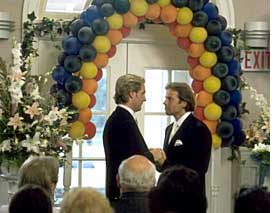 But
the biggest difference between the two can be summed up by the advertising
slogan for Queer as Folk: "No
Victims. No Martyrs. No Role Models." Common
Ground creates sympathy for victims, pleads for tolerance,
and relies on speeches to drive the point home. Queer
as Folk does none of these things. It just presents a story
for our entertainment without concerning itself with issues. And that,
perhaps more than anything else, makes Queer
as Folk one of the most groundbreaking and honest portrayals
of queer life to ever hit the airwaves. But
the biggest difference between the two can be summed up by the advertising
slogan for Queer as Folk: "No
Victims. No Martyrs. No Role Models." Common
Ground creates sympathy for victims, pleads for tolerance,
and relies on speeches to drive the point home. Queer
as Folk does none of these things. It just presents a story
for our entertainment without concerning itself with issues. And that,
perhaps more than anything else, makes Queer
as Folk one of the most groundbreaking and honest portrayals
of queer life to ever hit the airwaves.
It's a good bet,
considering the names involved, that Common
Ground will be released on video. At presstime there was
no release date announced yet. Queer as Folk
is not currently available on video in the U.S., but a
British import is available for rent at Mondo Video, 1109 Elmwood Avenue.
A two hour sequel just finished airing in Great Britain and Mondo also
plans to carry this tape when it is released sometime in March. Also,
filming begins in May for an American remake that will be aired on Showtime.
It will be interesting to see how much the original script is butchered
to make it more "acceptable" to American viewers.
[Reviewer's
note from 2007: I have to eat my hat on that last comment. The Showtime
version of Queer
as Folk
was just as in-your-face as the British edition was, even more so. However,
back in 2000, I never thought - and with good reason - that I would
ever
see anything made for American television as explicit as the original
British show was.]
See
also:
Queer As Folk Season One (premiere)
Queer
As Folk Season One (conclusion)
Queer As Folk Season Two
More on Britain's
Channel 4:
Derek Jarman
My Beautiful Laundrette
Metrosexuality
Nighthawks
Sebastiane
More on Terrence
McNally:
Love!
Valour! Compassion!
More On Brian
Kerwin and Harvey Fierstein:
Torch
Song Trilogy
More On Steven
Weber:
Choose
Connor
Jeffrey
More On Jason
Priestly:
Love
And Death On Long Island
Die,
Mommie, Die!
More On Helen
Shaver and Donna Dietch:
Desert
Hearts
|


